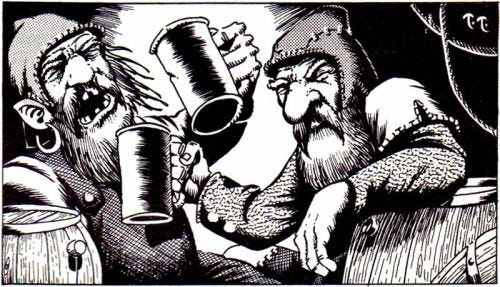I often see people refer to the OSR as relying on player skill instead of character skill. Likewise the solution to the obstacles you face is not likely found on your character sheet as some racial or class feature; instead, you must use your own wit to creatively overcome the hazards that stand between you and glittering riches. I think those are apt qualifiers for part of what defines the old school style. I’m going to take those qualities in this letter and stretch them to their maximum.
Do you remember the first time that you encountered a mimic as a player? Hold onto that memory as I continue. There are many firsts that players experience, and they can create long-lasting impressions in their memories or psyches. Along with the previous tidbits for OSR play, I would like to make the case for another: player knowledge is a resource that may be drawn from. If you have ever played an RPG video game, such as Baldur’s Gate, Skyrim, or Dark Souls, there are similar experiences to be had; gaining Branwen as a companion, the location of words of power, or where monsters jump out to surprise you are learned when playing those respective games. Starting a new character gives you a chance to play the game and use the knowledge you gained from the previous character to your advantage.
This concept does not transfer perfectly into a tabletop game, but it does transfer. Assuming a singular campaign setting, there are constants in the world that are naturally made known through play. Describing an ankheg to players surely paints a grim picture, but it’s after it spits acid at them that they learn about that power. Suppose everybody dies from that ankheg, so they all make new characters. Naturally, they all decide to go back to that ankheg to collect their old characters’ equipment, perhaps armed with some way to counter or avoid the acid attack. Sure, I’m making a few assumptions, namely that their old characters had gear worthy of retrieval but not good enough to stave off a TPK.
The point is, the end of a character doesn’t have to mean the player has to pretend to disinherit the knowledge they accumulated up until that point. The penalty for death is the loss of XP, relations with NPCs, and, depending on circumstances, treasure, equipment, and holdings. On top of that, now they have to cover their eyes when something familiar sticks out to them, looking the other way as they bumble into whatever fate awaits them. People have leveraged past mistakes into future gain since forever, so I would go as far as to say that bounded player knowledge is unnatural. The challenge then is when applying this principle to a span of campaign settings. As DMs are wont to do, monsters may have altered qualities or be made not to exist at all in many cases. It is not unreasonable to expect players to experience each campaign as if playing for the first time. After all, an ankheg may well breathe fire in another campaign setting. No, my petition for player knowledge as a constant is confined to the individual settings.
In some mechanical aspects of at least the original games, there seems to be the assumption that player knowledge actually is expected to be applied. Traps, for example, do not always trigger and may or may not reset over time. This mechanic combats perfect knowledge by creating artificial uncertainty. The reaction roll similarly does this by not giving players a constant expectation for attitudes and dispositions of NPCs and monsters. Even if a new party is made that encounters those scenarios, the ambiguity endorsed by the mechanics means that the players’ knowledge may yet be thwarted. This is the correct answer, in my opinion, and one that seems to have been honed by practice. Rather than attempt to erase the memory of players, the mechanics of a game should rationalize itself to the experience of normal humanity and integrate methods of subverting those expectations in interesting ways. Forcing players to pretend they don’t know anything about past events can put them in a “gotcha” situation, and the game plays beautifully well by working with the human spirit rather than against it.
With all that being said, it’s not wrong to play with transient player knowledge as a rule, and, in fact, that’s how I have run my games so far. This is an idea that came to me as I considered what differences roleplay gaming has with other genres of tabletop games, like board games, and what expectations might need revision to make them more similar. The players in my Basic Fantasy campaign are all new to the more distinguishing characteristics of old school play, if not to tabletop roleplaying games entirely, so they really are experiencing a lot of things for the first time. I have not yet had to cross the bridge I built in this letter, but, when I inevitably do, I will consider these words and revaluate them if necessary.





